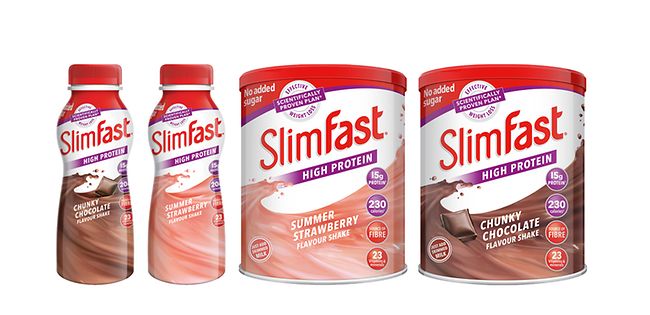Glanbia announced the acquisition of SlimFast, the famous meal replacement brand dedicated to weight loss. Very popular in the 80s and 90s, SlimFast suffered enormously from the evolution of the weight management market. Would this acquisition mark a turning point in SlimFast’s positioning? Will we soon see SlimFast again in France?
Glanbia, SlimFast: common interests
Irish giant Glanbia has just announced the acquisition of SlimFast from Kainos Capital for €300 million. Glanbia masters many activities in nutrition (functional ingredients, finished products with proprietary brands, processing) with a historical know-how rooted in the dairy sector. The group has gradually made acquisitions, such as Optimum Nutrition, which was acquired in 2008. This sports nutrition brand specializes in whey. As of today, it is SlimFast that Glanbia intends to support.
SlimFast had its glory days, when weight loss could be’aggressive’ as long as it was effective. But the famous American brand has since experienced a radical decline.
A look back at SlimFast’s journey in 3 dates
2000: Unilever buys SlimFast from Soleil Nutritionnel Ltd for €1.8 billion. During his time at Unilever, SlimFast was gradually removed from the shelves. In France, products were first removed from the pharmacy to focus on supermarkets. The complete withdrawal from the French market followed shortly thereafter.
2014: SlimFast passes into the hands of Kainos Capital, a fund that, like many others, has followed the nutrition-health trend. The amount paid by Kainos is not official, but Unilever would have lost money since estimates speak of a sale of around €800 million[2].
2018: Kainos sells SlimFast to Glanbia for €300 million. The devaluation of the brand has been harsh, to the benefit of Glanbia, which is acquiring a nugget that is just waiting to be awakened.
Who is SlimFast?
SlimFast was founded in 1977 in the United States. The company specializes in weight loss through meal replacements. The success is phenomenal thanks to a revolutionary approach to weight loss. The principle: replace 2 of the 3 meals of the day with a high-protein substitute, all for 1,200 kcal per day. The results are obviously there and SlimFast can boast 16 clinical studies involving more than 1,000 overweight people, with an average weight loss of 6 kg over 6 weeks.
Reasons for the fall of SlimFast
We see 2 main reasons:
- The success of high-protein diets, starting with the Dukan diet. What is the point of forcing yourself to drink shakes when you can eat « normally », for the same result?
- The profound change in weight management. It is now more sustainable and based on a balanced diet, i.e. the exact opposite of what SlimFast offers. In this field, it can be seen that nutrition (= eating balanced meals) takes precedence over nutraceuticals (= substitutes, food supplements). It is interesting to look at the sales of slimming food supplements in France: over the period 2015-2017, the slimming market is growing less quickly than the overall market for food supplements, with a respective growth rate over the period of 21% vs. 24%. [1]
Towards all-in-one and healthy snacking?
At Culture Nutrition, we are regularly surprised by the success of all-in-one drinks vs. the failure of meal replacements such as SlimFast. We are surprised, but of course we see several major differences:
- The target: women who want to lose weight on the one hand; young active men/women on the other
- Nutritional value: high protein on the one hand; the equivalent of a balanced meal on the other
- Frequency: every day, twice a day, for 6 weeks on one side; occasionally at lunch on the other
In short, all-in-one meal brands such as Feed, Smeal and others are to be commended for successfully repositioning the meal replacement concept. Is this the direction Glanbia wants to give to SlimFast? Will they stay the course on weight management? Or choose the path of healthy snacking, which is also at the heart of the thinking of many players in the food industry? Don’t forget to leave us your opinions on the subject for comment.
[1] Synadiet
[2] Foodive












